Page 124 of 352 pages « First < 122 123 124 125 126 > Last »
Black Jack tobacco
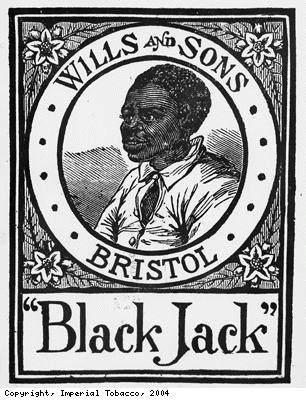
Description:
Wrapper for Wills and Sons’ Black Jack tobacco.
“Even after the freeing of slaves in America in 1865, many African Americans continued to work on the tobacco and cotton plantations where they had previously worked as slaves.� This, and the attitude to black people generally, was reflected in the continued use of the image of a black man or woman on British tobacco packaging and advertising until about 1960.”
Reproduced with kind permission of Wills (now Imperial Tobacco).
Creator: Wills and Sons
Date: unknown
Copyright: Copyright, Imperial Tobacco
Object ID:Foster Collection A13/47
Fine Shagg tobacco
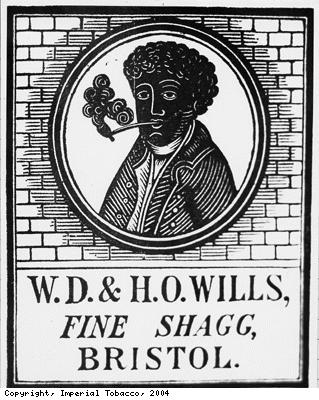
Description:
Wrapper for WD and HO Wills’ Fine Shagg tobacco.
“Even after the freeing of slaves in America in 1865, many African Americans continued to work on the tobacco and cotton plantations where they had previously worked as slaves.� This, and the attitude to black people generally, was reflected in the continued use of the image of a black man or woman on British tobacco packaging and advertising until about 1960.”
Reproduced with kind permission of Wills (now Imperial Tobacco).
Creator: WD and HO Wills
Date: unknown
Copyright: Copyright, Imperial Tobacco
Object ID:Foster Collection A13/35
Superfine Shagg
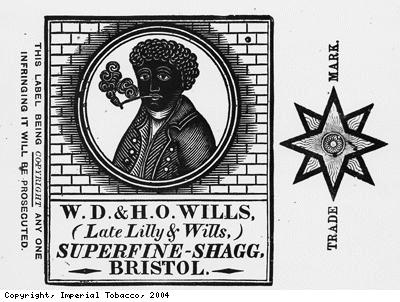
Description:
Wrapper for WD and HO Wills’ Superfine Shagg tobacco.
“Even after the freeing of slaves in America in 1865, many African Americans continued to work on the tobacco and cotton plantations where they had previously worked as slaves.� This, and the attitude to black people generally, was reflected in the continued use of the image of a black man or woman on British tobacco packaging and advertising until about 1960.”
Reproduced with kind permission of Wills (now Imperial Tobacco).
Creator: WD and HO Wills
Date: unknown
Copyright: Copyright, Imperial Tobacco
Object ID:Foster Collection A2/1041
Superfine Shagg tobacco
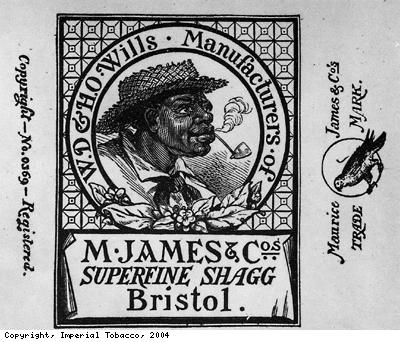
Description:
Wrapper for WD and HO Wills; M James and Company’s Superfine Shagg tobacco.
“Even after the freeing of slaves in America in 1865, many African Americans continued to work on the tobacco and cotton plantations where they had previously worked as slaves.� This, and the attitude to black people generally, was reflected in the continued use of the image of a black man or woman on British tobacco packaging and advertising until about 1960.”
Reproduced with kind permission of Wills (now Imperial Tobacco).
Creator: WD and HO Wills
Date: unknown
Copyright: Copyright, Imperial Tobacco
Object ID:Foster Collection 949/10
Old Friend tobacco
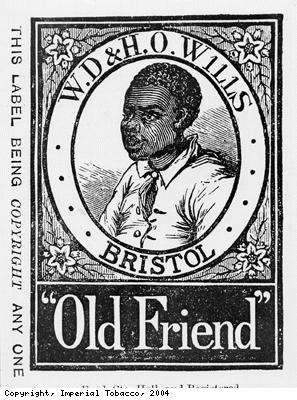
Description:
Wrapper for WD and HO Wills’ Old Friend tobacco.
“Even after the freeing of slaves in America in 1865, many African Americans continued to work on the tobacco and cotton plantations where they had previously worked as slaves.� This, and the attitude to black people generally, was reflected in the continued use of the image of a black man or woman on British tobacco packaging and advertising until about 1960.”
Reproduced with kind permission of Wills (now Imperial Tobacco).
Creator: WD and HO Wills
Date: unknown
Copyright: Copyright, Imperial Tobacco
Object ID:Foster Collection 949/10
Stansfield’s Superfine Ragg tobacco
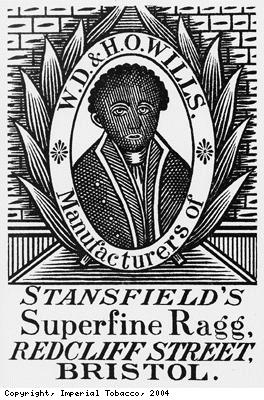
Description:
Wrapper for WD and HO Wills’ Stansfield’s Superfine Ragg tobacco.
“Even after the freeing of slaves in America in 1865, many African Americans continued to work on the tobacco and cotton plantations where they had previously worked as slaves.� This, and the attitude to black people generally, was reflected in the continued use of the image of a black man or woman on British tobacco packaging and advertising until about 1960.”
Reproduced with kind permission of Wills (now Imperial Tobacco).
Creator: WD and HO Wills
Date: unknown
Copyright: Copyright, Imperial Tobacco
Object ID:Foster Collection A2/1014
Superfine Shagg tobacco
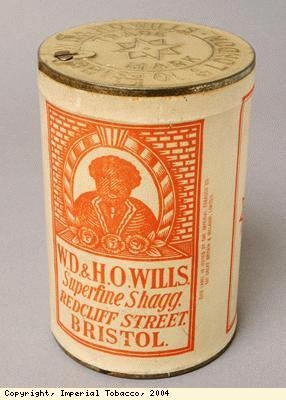
Description:
Tin of WD and HO Wills’ Superfine Shagg tobacco, possibly 1930s.
“Even after the freeing of slaves in America in 1865, many African Americans continued to work on the tobacco and cotton plantations where they had previously worked as slaves. This, and the attitude to black people generally, was reflected in the continued use of the image of a black man or woman on British tobacco packaging and advertising until about 1960.”
Reproduced with kind permission of Wills (now Imperial Tobacco).
Creator: WD and HO Wills
Date: c.1930s
Copyright: Copyright, Imperial Tobacco
Object ID:Wills Collection I 15/4
Superfine Ragg
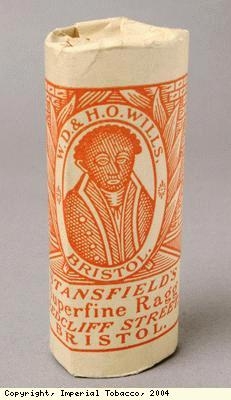
Description:
Packet of Stansfields’ Superfine Ragg tobacco.
“Even after the freeing of slaves in America in 1865, many African Americans continued to work on the tobacco and cotton plantations where they had previously worked as slaves. This, and the attitude to black people generally, was reflected in the continued use of the image of a black man or woman on British tobacco packaging and advertising until about 1960.”
Reproduced with kind permission of Wills (now Imperial Tobacco).
Creator: Stansfield
Date: 20th century
Copyright: Copyright, Imperial Tobacco
Object ID:Wills Collection I 15/4
Fine Shagg tobacco
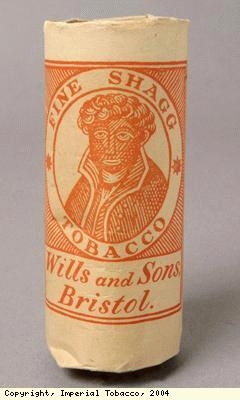
Description:
One side of a packet of Wills and Sons’ Fine Shagg tobacco.
“Even after the freeing of slaves in America in 1865, many African Americans continued to work on the tobacco and cotton plantations where they had previously worked as slaves. This, and the attitude to black people generally, was reflected in the continued use of the image of a black man or woman on British tobacco packaging and advertising until about 1960.”
Reproduced with kind permission of Wills (now Imperial Tobacco).
Creator: Wills & Sons
Date: 20th century
Copyright: Copyright, Imperial Tobacco
Object ID:Wills Collection I 15/4
Superfine Shagg tobacco
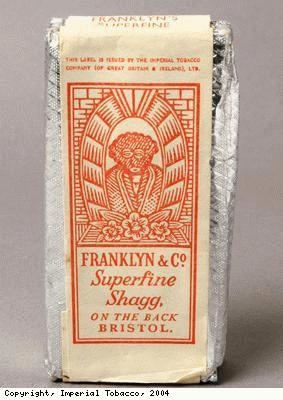
Description:
Packet of Franklyn and Company’s Superfine Shagg tobacco, possibly from the 1950s.
“Even after the freeing of slaves in America in 1865, many African Americans continued to work on the tobacco and cotton plantations where they had previously worked as slaves.� This, and the attitude to black people generally, was reflected in the continued use of the image of a black man or woman on British tobacco packaging and advertising until about 1960.”
Reproduced with kind permission of Wills (now Imperial Tobacco).
Creator: Franklyn and Company
Date: c.1950s
Copyright: Copyright, Imperial Tobacco
Object ID:Bennett Collection
Page 124 of 352 pages « First < 122 123 124 125 126 > Last »

